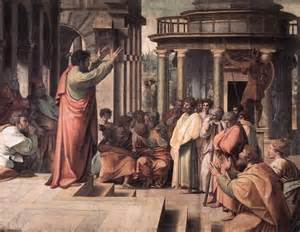By: Sherene Nkouri, Ph.D. | November 24, 2024
Introduction
Cultures are like a pair of glasses; they all have a shared set of assumptions about life that is called a worldview. Paul Hiebert defines culture as “the more or less integrated systems of ideas, feelings, and values and their associated patterns of behavior and products shared by a group of people.”[1] The culture during the time of Paul is no exception. Paul’s theology intersects with the culture at that time. It does not operate on the level of theological ideas and information alone, but it also embraces both the beliefs and the social practices of the people at his time—their everyday way of living in society. I discuss Paul’s contextual approach to the gospel by focusing on his conversion, flexibility, and ultimate goal.
Paul’s Cultural Background
Paul has a rich diversity in his cultural background. His experience intersects with the Palestinian geography, the Jewish religious view, the Greek culture, and the Roman nationality. He is a dual citizen, born to a Jewish family who lived in Tarsus in Asia Minor. While he learns at the feet of a Jewish rabbi, he becomes multilingual and well acquainted with the Old Testament theology, Greek language, and Hellenistic culture—religious beliefs, political and social life, and ethical teachings.[2]
To hold that Paul’s gospel and ethics are shaped solely by Jewish culture would be to perpetuate a minor understanding of his background. As Flemming states, “The values of honor and shame, for example, the concern for kinship and group identity, the belief in good and evil supernatural powers, all of which run through Paul’s letters, are widely attested in both Jewish and Greco-Roman sources.”[3] In the contexts in which Paul lived, there was a constant overlapping and intermingling of the two.
Paul’s Theological Methodology
Paul’s theological approach was Christocentric. He does not base his beliefs on “timeless theological truth or ‘supracultural’ principle, but on a contingent, historical happening: the event of the crucifixion and resurrection of Jesus of Nazareth.”[4] The content of the message Paul preaches is Christ (Rom 16:25; 1 Cor 1:24; 15:12; Phil 1:15–18, ESV), the Son of God (Rom 1:9; 2 Cor 1:19; Gal 1:16), Jesus is Lord (2 Cor 4:5), and Jesus crucified (1 Cor 1:23). His theological method does not stop at Jesus death, because the redemptive work is not complete without his resurrection (1 Cor 15:3–4; Rom 4:24–25; 2 Cor 4:14; 1 Thess 4:14).
Paul’s theology is very important to see a gospel movement established in a biblical way. If missionaries preach a gospel that is not Christocentric, then they are not preaching the gospel. One of the non-negotiables of evangelism is sharing the death, deity, and resurrection of Jesus Christ. When I was in the Middle East, the teaching of my local church emphasized the death of Christ, but not his resurrection. Here in the US, some pastors always teach about the necessity of evangelism, but they do not teach the congregation how to do it in a biblical way.
When people talk about their methods, they include prayers for healing, the death of Jesus on the cross, and an invitation to church. They do not include his deity and resurrection. I believe that the effective and biblical message of the gospel should follow Paul’s method of sharing the death, deity, and resurrection of Jesus.
Paul’s Contextual Approach to the Gospel
Paul’s Conversion
Paul uses his conversion story to convey the gospel message to the people. I never used my conversion story as an evangelistic method. The reason is that I never had a major change before and after my conversion. I was just a child who was trying to please her mother and honor her father. So, I grew in my faith while following the Christian instructions of my parents. I did not turn from an evil monster into a humble sheep. It seems, however, that what I was neglecting in my testimony is the blessings and the changes that God brought into the later stage of my life as an adult. I could have used how God moved me into different places and taught me several lessons to stay faithful to him.
Paul’s Cultural Flexibility
Paul’s flexibility is very clear in his contextual approach. It enables him “to appropriate traditional language and images and recontextualize them under the guidance of the Spirit.”[5] The best example is Paul’s concept of circumcision, which shows his opposition to “requiring Gentile converts to be circumcised—as a metaphor for the death of Christ and its saving significance for believers (Col 2:11).”[6] True circumcision is no longer the basis of salvation, but an inward work of God in the heart of believers (1Cor 7:17; Phil 3:3).
Paul was not forcing the Gentiles to follow the Jewish law nor the Jews to revoke their law. He was asking them to show flexibility because faith and good behavior are what count, not outward racial or ethnic requirements. His flexibility helped him to become “as a Jew to the Jews and as a Greek to the Greeks” (1 Cor 9:19–23). Learning how to be flexible without breaking the word of God is not easy because we do not want to undermine the authority of the Bible, at the same time, we want to convey to people that the era of Christ is for grace, not the law.
Paul’s Ultimate Goal
Paul’s ultimate goal of proclaiming the gospel was not to gather the largest number of people around him nor to start a new religion. For Paul, the gospel not only reveals what God has done to save humanity but also what God has done is good news for us. The gospel is at the center of his proclamation. It has the power to transform criminals into respectful obeying citizens. It is the good news to the world (Rom 1:16; 1 Thess 1:5), and Paul’s goal. Flemming is right when he states, “Paul does not think of the gospel as a body of propositional truth or as simply a matter of correct belief. Its purpose is to elicit saving faith and to create a redeemed community that is being reshaped in the image of the Lord (2 Cor 3:18).”[7]
Bibliography
Hiebert, Paul. Anthropological Insights for Missionaries. Grand Rapids, Mich.: Baker, 1985.
Flemming, Dean. Contextualization in the New Testament: Patterns for Theology and Mission. Downers Grove, IL: InterVarsity Press, 2005.
[1] Paul Hiebert, Anthropological Insights for Missionaries (Grand Rapids, Mich.: Baker, 1985), 30.
[2] Dean Flemming, Contextualization in the New Testament: Patterns for Theology and Mission (Downers Grove, IL: InterVarsity Press, 2005), 123–124.
[3] Ibid., 122.
[4] Ibid., 94.
[5] Ibid., 110.
[6] Ibid., 111.
[7] Ibid., 102.
Sherene Khouri, Ph.D.: Contributor
Sherene Khouri was born into a religiously diverse family in Damascus, Syria. She became a believer when she was 11 years old. Sherene and her husband were missionaries in Saudi Arabia. Their house was open for meetings, and they were involved with the locals until the government knew about their ministry and gave them three days’ notice to leave the country. In 2006, they went back to Syria and started serving the Lord with RZIM International ministry. They traveled around the Middle Eastern region—Turkey, Jordan, Egypt, Lebanon, Syria, and United Arab Emirates.
Sherene was also involved in her local church among the young youth, young adults, and women’s ministry. In 2013, the civil war broke out in Syria. Sherene and her husband’s car was vandalized 3 times and they had to immigrate to the United States of America. In 2019, Sherene became an American citizen.
Sherene is an Assistant Professor at Liberty University. She teaches Arabic, Religion, and Research classes. Additionally, she holds a Ph.D. in Theology and Apologetics, M.A. in Christian Apologetics from Liberty University, and B.S. in Biblical Studies from Moody Bible Institute. Currently, Sherene is also working on a Master of Theology in Global Studies at Liberty University and M.A. in Arabic and linguistics from PennWest University.





